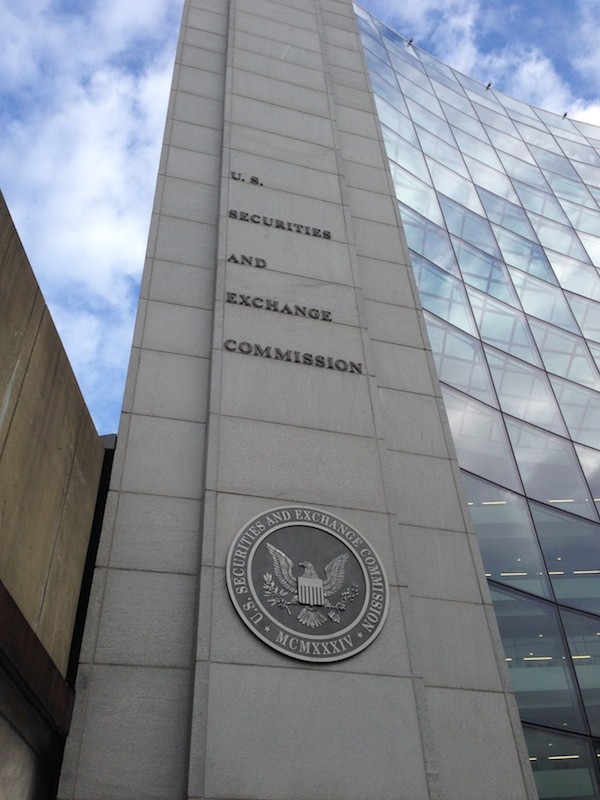New crowdfunding rules The good and bad news for entrepreneurs and investors The Washington Post
Post on: 16 Март, 2015 No Comment

The Securities and Exchange Commission on Wednesday proposed new rules that would allow entrepreneurs to raise small amounts of capital from anyone in the country through online portals. (Joshua Roberts/Bloomberg)
The Securities and Exchange Commission’s newly proposed crowdfunding rules span a whopping 585 pages, so naturally, it took experts and analysts the better part of a few days to wade through all the details in the text.
Now that the dust is beginning to settle, it’s clear that the proposal included some good news and some not-so-good news for those waiting to take advantage of the new rules, which would allow entrepreneurs to raise small amounts of capital from lots of people through new online funding portals.
Here’s a look at the pluses and minuses for those entrepreneurs and their prospective investors .
The good news for entrepreneurs: Self-certification and flexibility
There was plenty to be pleased about last week for entrepreneurs hoping to take advantage of the new crowdfunding rules. Most importantly, regulators proposed making investors responsible for tracking how much they are allowed to invest under new crowdfunding limits (more on that in a moment). Some had feared the SEC might put that onus on the firms or the funding portals.
In addition, the proposal would not count crowdfunding investors toward a company’s owner total, Once a company has more than 2,000 people with ownership stakes, businesses are no longer considered a “microcap” company and must register with the SEC.
The exemption therefore “decreases the level of compliance and regulatory burden crowdfunding will impose on companies,” Richard Swart, director of research for the Innovation in Entrepreneurial and Social Finance program at the University of California at Berkeley, wrote in a blog post about the proposal.
Ryan Feit, a board member for Crowdfund Intermediary Regulatory Advocates (CFIRA), which lobbies for the crowdfunding industry, noted that the original law seemed to imply that firms would have to establish a specific funding target and either raise exactly that amount or nothing at all.
However, regulators have “implemented some flexibility,” he said, allowing entrepreneurs to set minimum and a maximum fundraising goals.
“Now you could say ‘I want to raise at least $250,000 but I’ll take all the way up to $750,000 if there is more demand from investors,’ ” Feit said. “That’s very important they added that in there.”
The bad news for entrepreneurs: Audit and annual filing requirements
Some are concerned that a couple new regulatory hoops could undermine the law’s intent, potentially deterring entrepreneurs who might have thought about crowdfunding.
The first is a requirement that all firms raising more than $500,000 a year (or less than a maximum $1 million) must provide audited financial statements. The proposed rule is meant to protect investors from oversized scams or losses, but some worry that a full audit will prove too costly for promising young firms, particularly those that are not yet generating revenue.
“That could put a real freeze on companies looking to raise more than a half million dollars,” Jason Best, one of the founders of Crowdfund Capital Advisors, a consulting firm for investors and entrepreneurs, said in an interview.
The second sticking point is a rule requiring firms to report financial information to the SEC every year until they either go public, go under or get acquired. Some warn that will prove too much of a hassle for entrepreneurs who might otherwise have considered raising money through crowdfunding .
“It’s a lot to be required of issuers for relatively small raises,” Daniel Gorfine, director of financial markets policy at the Milken Institute, said in an interview. “It remains to be seen whether those costs and burdens will outweigh the potential capital-raising benefits.”
Rory Eakin, chief operating officer for CircleUp, a crowdfunding platform that connects firms to accredited investors, cited both the auditing and annual filing requirements in an e-mail to On Small Busines s, adding that “it’s hard to imagine attractive companies will take advantage of these proposed rules.”
He called the proposal “a disappointing outcome for companies and investors, though to be fair the SEC has a difficult task here.”
The good news for investors: A higher investment limit and a place to talk
Congress tasked regulators with establishing crowdfunding investment limits based on either an individual’s net worth or his or her annual income — however, lawmakers did not specify which of those two numbers should be used or whether the decision should be left up to investors. In response, the SEC took the lenient route, proposing to allow investors to choose whichever number (their income or their worth) affords them the higher investment cap.
“It seems like a reasonable interpretation of the ambiguity in the law,” Gorfine said, noting that regulators could have chosen one of the two metrics or restricted individuals to their lower limit.
Gorfine said investors should also be pleased that the proposed rules require crowdfunding portals to build communication tools for investors, allowing them to share their thoughts and concerns about companies trying to raise capital.
“What makes these portals so interesting is that the crowd can share their views and opinions with one another,” he said, later adding, “that’s what we’ve seen so far with the non-financial-return crowdfunding model, where the collective voice comes through, and [SEC officials] seem to be trying to bake that aspect of the existing crowdfunding model into the crowd-investing model.”
The bad news for investors: No access to foreign firms and no advice
Under the proposed rules, regulators would deny access to several groups. As a result, crowdfunding investors would not be able to invest in foreign ventures, several types of investment firms or companies that already report to the SEC.

An additional restriction on investors (included in the law itself) forbids crowdfunding investors from selling or transferring their stake in a company during the first year after the purchase.
Lastly, investors could not receive any investment help from crowdfunding portals, which the SEC banned in its proposals from providing any type of investment advice or recommendations. In fact, portals would not even be allowed to manually filter out offerings that they deem unfundable.
“The reality is a lot of start-ups looking to raise capital are either not ready to raise capital or are simply not fundable,” Feit, who is also the chief executive of New York-based SeedInvest, said. “It would be helpful if we could filter out the noise as well as add another layer of fraud protection for our investors.”
The good news for both: A unanimous vote
The biggest surprise, according to Best, was that the commissioners voted 5-0 to move forward with the proposed rules.
“I certainly thought we would have a majority of the votes, but for it to be unanimous, I think, makes it historic,” Best said during the interview, pointing out that commissioners were initially split on some of the earlier regulatory changes authorized by the JOBS Act .
Feit called the outcome “a great sign” that regulators will move swiftly to finalize the rules necessary for equity-based crowdfunding.
The bad news for both: It still may take a while
The proposal has now entered a 90-day comment period, in which investors, entrepreneurs and state regulators have a chance to weigh in on the rules. However, with nearly 600 pages of text and nearly 300 questions posed in the proposal, some say regulators are likely to extend the comment period.
Once that window does close, it may still take the SEC several months to consider the comments and craft a final set of rules.
John Callaghan, one of the founders of crowdfunding portal iCrowd based in New York, noted that it took regulators more than a year to draw up a much more straightforward provision of the JOBS Act, which lifted a ban on advertising private securities to investors. On that change, he said, there were only a few variables that had to be addressed in the initial proposal.
“Here, they are creating a brand new type of financial intermediary and a whole new regulatory process,” he said of the new crowdfunding proposal.
Feit and Best predicted the rules will likely be finalized by next summer. Callaghan, though, says it could be as late as the fourth quarter of 2014 before new crowdfunding portals are given the green light by the SEC.
J.D. Harrison covers startups, small business and entrepreneurship, with a focus on public policy, and he runs the On Small Business blog.














